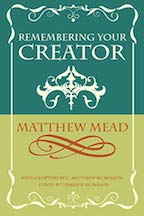Remembering Your Creator by Matthew Mead

Matthew Mead——the popular Puritan Preacher——begins his exposition of Ecclesiastes 12:1 by isolating the two great duties of the Christian life, ". . . to cease to do evil and to learn to do well." This 17th-century Minister of the Gospel has this great insight (that should seem obvious, yet I found it to be profound): "A man cannot be considered good that does not cease to do evil." No believer successfully ceases to do evil altogether. If that were possible, then sinless perfection would be attainable in this life, but it is not. To any who thinks it is a possibility, I highly recommend that you read J.C. Ryle's book "Holiness." Ceasing to do evil should characterize the way a Christian lives. In seeking to do good to our fellow man, we follow our Lord Jesus Christ who went about doing good more than any man ever has.
Mead, further reflecting on Ecclesiates 12:1a, writes, "Remember now your Creator . . . the sum of all religion lies in the observation of this one command. There can be no such thing as religion where God is forgotten." Remembering God is essential to godliness in general. Any conscious sin that is committed requires a forgetting of God. God's omnipresence is forgotten and God's hatred of iniquity is not remembered. Having "a God-consciousness" is an indispensable part of becoming more holy.
Pastor Mead gives this sober warning to those who will not remember their Creator: "In Hell . . . God is perpetually remembered there, not as a duty, but as a punishment." Those in Hell will remember God more in Hell than they ever did in this life (and it would have been a comfort to them, both while they lived and in the life to come). But in Hell, their remembrance of their Creator will cause them great and endless agony.
We should be mindful of God because we receive new mercies from Him every day, and in so many ways: ". . . that power that created us at first creates us every day, you are made of God every day; for preservation is a continued creation." What great ingratitude it is for those who forget "their Maker and Preserver" and do not recall the multitude of his mercies to them.
I believe the Puritans were the great thinkers in their day, and this was joined with a love and devotion to their Savior, their Creator, and their God. Matthew Mead is best known for his classic "The Almost Christian Discovered." His other works, such as this, are so worthy of the attention of the Lord's people of our generation.
